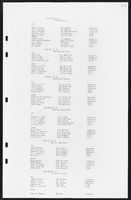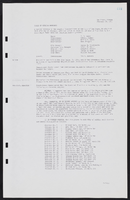Search the Special Collections and Archives Portal
Search Results
Brown, Hannah, 1939-
Hannah Brown was born in Arkansas on June 23, 1939. She moved to Las Vegas, Nevada with her family in 1945. Brown held executive management positions at both Western and Delta airlines. She is a member of the prestigious Links organization and the National Coalition of 100 Black Women.
Person
Dr. Agnes Lockette oral history interview
Identifier
Abstract
Oral history interview with Dr. Agnes Lockette conducted by Dennis McBride on March 25, 1996 for the Boulder City Library Oral History Project. In the interview, Lockette discusses her experiences teaching in the Clark County, Nevada School District (CCSD) and at the University of Nevada, Las Vegas (UNLV). Lockette begins by talking about studying at Albany State College in Albany, Georgia, moving around the United States due to her husband's military service, and finally settling in Boulder City, Nevada in 1953. She also discusses racial integration in CCSD and in her own classrooms at the Westside School (Las Vegas Grammar School) and C. T. Sewell Elementary School during the 1960s. Other subjects Lockette covers include the expansion of the Las Vegas, Nevada hotel and casino industries in the early 1950s, the increasing student population, teaching conditions, and other educators in Las Vegas including Mabel Hoggard and James Dickinson. Lastly, Lockette recalls her experiences with UNLV, community support and engagement for education, and working toward her master's and doctoral degrees in English.
Archival Collection
Whaley, Nathaniel, 1934-
Nathaniel Whaley was born on July 01, 1934 in Tallulah, Louisiana. He moved to Las Vegas, Nevada in 1943. He married his wife Eva, in 1984. Before leaving high school to provide for his new wife and son, Nathaniel had a successful high school career as an accomplished athlete and Eagle Scout in the first black Boy Scout troop in the area. Nathaniel would go on to have a fruitful career as a mason and contractor, literally helping build the city of Las Vegas. His jobs included the Dunes, the Sands, Union Plaza and the Maxim Hotel.
Person
Washington, Isadore
Isadore Washington was born in Tallulah, Louisiana, the son of Isadore Washington, Sr., and Destelle Washington. His father came out to Las Vegas, Nevada in the 1930s to work on Hoover Dam, and the family followed in 1942 when Isadore was eight years old. His mother worked at the El Rancho and Last Frontier Hotels, the Shaw Apartments and Harrison boarding house on the Westside where black entertainers were expected to stay. Washington recalls playing with Wayne Newton when they were children and life on the Westside where he attended the Westside School.
Person
Eddie Wright Jr. and Johnie B. Wright oral history interview
Identifier
Abstract
Oral history interview with Eddie Wright Jr. and Johnie B. Wright conducted by B. Leon Green on October 6, 2012; October 13, 2012; November 16, 2012; and November 28, 2012 for the African Americans in Las Vegas: a Collaborative Oral History Project. Wright and Wright Jr. discuss coming to Las Vegas, Nevada and their careers as a teacher/nursing aid and a ticket agent at the local Greyhound station, respectively.
Archival Collection
Buford, Eugene
Eugene Buford came to Las Vegas, Nevada from Birmingham, Alabama, when he was two years old with his mother and grandmother. He held a variety of jobs, including washing dishes at the Last Frontier and delivering ice to casinos like the Flamingo and the Stardust, and ultimately retired after thirty-six years with the Post Office. Buford's great grandmother, Mary Nettles, was instrumental in the formation and growth of the NAACP chapter in Las Vegas, and he recalls meetings in her house and his own role as president of the Junior League NAACP.
Person
Kirkland, Barbara Bates (1934)
Barbara Bates Kirkland was born 1934 in Shreveport, Louisiana. On a sunny day in 1946, Kirkland and her mother stepped off the train from Shreveport and onto the Western street of Fremont in Las Vegas, Nevada.
Kirkland’s mother, Atha Toliver, found employment as a maid. Toliver, who was determined that her daughter would get an education and a finer future, saw this as her opportunity to achieve this for her daughter. Later, she opened Eva’s Flower Basket, a floral shop that Kirkland would operate after retiring from teaching.
Person


